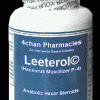Cocaine plays with the 'yes-no' pathway in the brain. This means in essence it disrupts the natural path of the brains energy. That means your brain has to expend energy putting it back to how it should be. Every drug that joins or touches a biological compound effectivly renders it useless after its ionic effect has worn off. The body then has to dispose of the spent compound, usually putting a massive strain on the immune system. If this was not the FACT then drugs would work, drugs seldom replace a fresh herb or fortified nutritional intake. If you want to raise L-dopa levels you have to raise Serotonin levels, unfortunately your body seeks homeostasis. Unless you have used vitamin D3 with adiquate nutrition and exercise you really have a narrow viewpoint on the subject of human growth. Its all about balance after you get the building materials inside. Use organic gold standard vitamin D3, steer clear of synthetics, and believe. Drugs are not infinite in their effect, natrure is. People get confused with the effect of dopamine, its usually a peak effect you feel as the Serotnin raises to balance with it! Check out my other posts for more info, thanks.
Isn't it typically the other way around, raising serotonin triggers dopamine cascades, at least in terms of pleasure/reward pathways?
Also, it's hard to take you seriously, when your username is Multivitz, and you're plugging 'organic gold standard' vitamin D3 and herbs/nutrients. Not that I'm against (some) use of nutrients and supplements, but you just sound like someone who came on this site to shamelessly con people into buying some product.
I feel obliged to mention that you disagreed without mentioning any references, used extremely vague terminology, and are just a 'tad off topic here as well.
Oh , wow, I'm just gonna LOVE this thread!
Let me explain to you something very important (and don't worry , I will be writing an article on it soon)
It's not so simple as to say dopamine raises serotonin, or serotonin raises dopamine - but if you're gonna go with such an assumption - you should at least hear the ODDS THAT SEROTONIN WILL RAISE DOPAMINE ARE INCREDIBLY LOW!!!
- Dopamine inhibits dopamine at the D(2) receptors expressed as autoreceptors, whereas the post-synaptic D(2) receptors play a separate role in initiating endocrine responses and in controlling spasms and jerky movements.
-
- Dopamine at D(2) and D(3) receptors interact with AMPA-glutamate pathway, and have secondary effects on GABA-ergic neurons.
-
- Dopamine D(4) are similar to the two above, but may have a distinct or more specific action in depression and also on behavioral phenotypes.
-
- Dopamine D(1) and dopamine D(5) stimulate locomotion (an indice of anti-depressant effects & general QOL scores) .
Now here's the biggest point to remember, no matter which neurotransmitter you are talking about.
ALWAYS KNOW WHETHER THE RECEPTOR IS POSITIVELY OR NEGATIVELY COUPLED TO G-PROTEINS AND THUS ADENYLATE CYCLASE...
BECAUSE.....
If it's positively coupled it will have stimulatory effects and will increase basal and active metabolism as well as increase thyroid output and dopamine production. It will also signal HOMEOSTATIC mechanisms particularly signaling to serotonin 5-HT(1) autoreceptors to then decrease in moderation, the level of cAMP that was just increased...hence , this second messenger's all - important role in determining WHICH receptors get to handle the homeostatic feedback and partially determining the NET RATE of serotonin synthesis and activity. AKA that which is released in the blood stream or into the synapse BY THE MEANS of indirect autoreceptor activation that is the result of activating the conditional second messenger system of CYCLIC ADENOSINE MONOPHOSPHATE
If it's negatively coupled then we have an opposite array of effects, seeing instead of stimulation, we get depression, a decrease in dopamine synthesis and activity, and instead of 5-HT inhibitory signaling we get the potential CROSS-ACTIVATION of type 2 like serotonin receptors.
Additionally, those negatively coupled HAVE A TENDENCY to induce histamine and nitric oxide release, as well as GABA activity.
NOW LET'S GO BACK TO DOPAMINE AND SEROTONIN...IF YOU'VE ABSORBED THE ABOVE; then you're good!
Serotonin inhibits dopamine activity and release the type 1 receptors, as well as type 2, type 6 and type 5A receptors.
Whereas 5-HT3/4 have mixed effects , in some studies showing an enhancement in frontal lobe transmission, and in hippocampus mixed effects TRENDING WITH A DECREASE.
Therefore, all in all, there is a PROPENSITY & HIGHER LIKELIHOOD of serotonin to INHIBIT dopamine, than to raise it.
The NET effect of ANY neurotransmitter, especially MONOAMINES - is based on which receptors are available and the NET RATIO of heterodimized pairings and coincidentally, the ratio of NEGATIVE;POSITIVE FEEDBACK.
In other words, it simply comes down to more or less, if there is more positively coupled G-protein receptors being activated or more negatively coupled receptors being activated by premise or by consequence!
OR, IN EVEN SIMPLER TERMS....HOW MUCH CYCLIC AMP ONE HAS IS THE PRIMARY DETERMINANT TO TOTAL NERVOUS SYSTEM ACTIVITY AND THE BALANCE BETWEEN PARASYMPATHETIC AND SYMPATHETIC ACTIVITY THAT DETERMINES CENTRAL HOMESTASIS AND THUS THE PLAUSIBLE EXISTANCE OF DEPRESSIVE DISORDERS AND/OR THE TENDENCY TO SUCCUMB TO SUCH DISORDERS!
Edited by Area-1255, 07 February 2015 - 04:27 PM.











































































